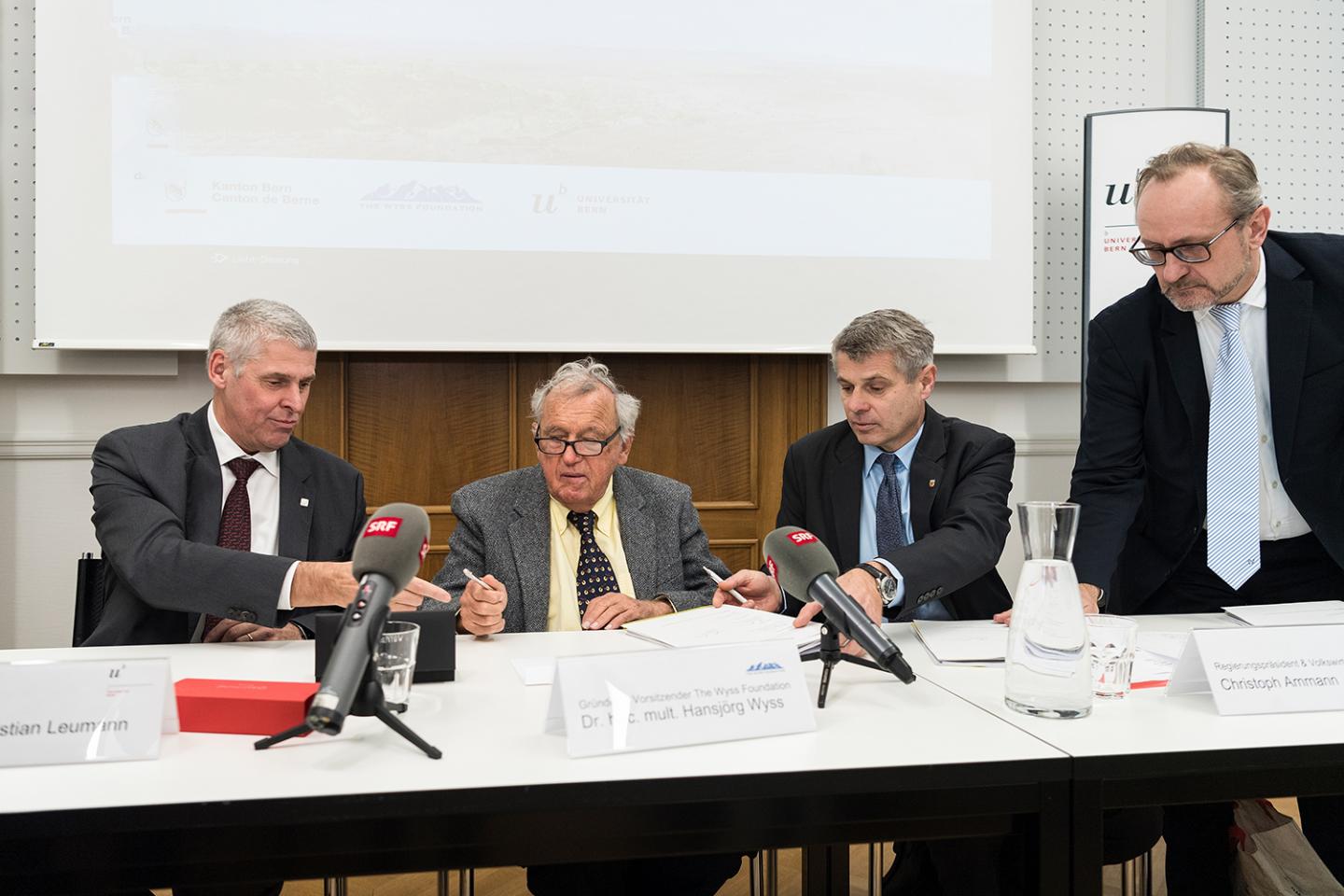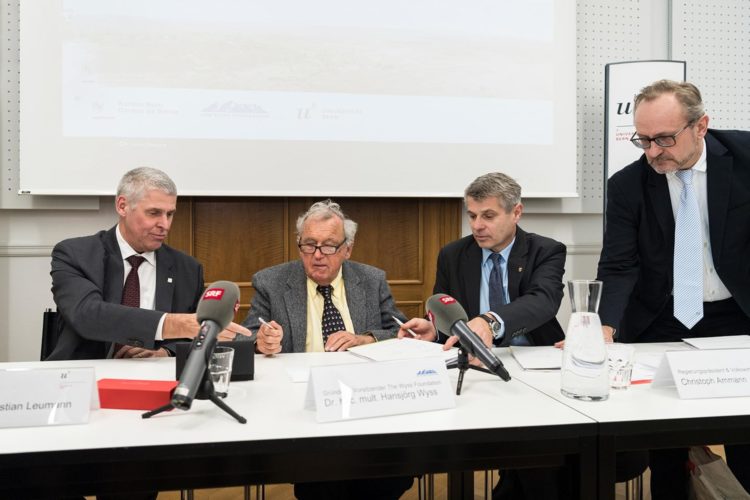
Credit: University of Bern, Image: Ramon Lehmann
Rapid biodiversity losses, accelerated climate change, and a growing demand for land resources – these developments and their consequences are closely interrelated. Where this is concerned, the following question is becoming increasingly pressing: How can the necessary nature conservation be reconciled with human well-being? The coming decade will be decisive in terms of whether and how we come up with forward-looking solutions on a global scale.
This is exactly the area in which the Wyss Academy for Nature tackles this issue: teams of scientists will join forces with experienced experts and representatives from the fields of policy, business and civil society on four continents to develop innovations aimed at protecting nature and ensuring the sustainable use thereof. The implementation-oriented applications, strategies and policy guidelines are tested at the hubs of the Wyss Academy and extended to other regions. The way the different stakeholders cooperate is also new: it breaks up the conventional silos of science, nature conservation, development cooperation and policy making. In this way, scientific findings are applied quickly and can take effect.
Pioneering environmental achievements
The Wyss Academy for Nature is made possible by the Bern entrepreneur and patron, Hansjörg Wyss. In the context of the Wyss Campaign for Nature, the Wyss Foundation is donating a total of 100 million Swiss francs. The Canton of Bern and the University of Bern are each contributing 50 million francs. The Wyss Academy for Nature offers the Canton of Bern and the University of Bern the unique opportunity to provide pioneering services where the environment and sustainability are concerned. Three world-renowned research institutions of the University of Bern are involved in the Wyss Academy: the Centre for Development and Environment (CDE), the Oeschger Centre for Climate Change Research (OCCR) and the Institute of Plant Sciences (IPS).
Unique opportunity for the Canton of Bern and the University of Bern
Cantonal Government President, Christoph Ammann, is convinced that “founding the Wyss Academy for Nature at the university presents a unique opportunity for the Canton of Bern,” adding that the University could become the world’s leading authority on transformational research. In his opinion, its close proximity to the Swiss Government and various federal administrative bodies facilitates cooperation at a national level and ensures its nationwide appeal. He goes on to say that apart from the benefit of gaining a reputation as an excellent location for higher education institutions, the Canton of Bern will also profit financially because establishing the Wyss Academy will lead to the creation of about 50 high-skilled jobs in the Bern region.
The canton’s 10-year financial commitment involves basic funding totaling 20 million Swiss francs and a 30-million implementation program which includes projects in the fields of biodiversity, climate change and land use. “With these projects, we want to show that economic development is reconcilable with the protection of nature in a comparatively highly developed region like the Canton of Bern,” says Cantonal Government President, Christoph Ammann. He adds that the projects’ innovation potential will be of great benefit to the people of the Canton of Bern and its natural environment. The projects planned in the subject areas of tourism, resource utilization, natural hazards, energy, agriculture and biodiversity are currently being finalized, so that it will soon be possible to provide information on them.
The canton’s investment in the Wyss Academy for Nature is part of the Bern Cantonal Governement’s program initiated at the beginning of 2019 entitled “Engagement 2030.” The Cantonal Parliament already approved the relevant loan for establishing the Wyss Academy last March. Cantonal Government President, Christoph Ammann, took advantage of the meeting to sign the contract to personally extend his heartfelt thanks to Hansjörg Wyss on behalf of the Cantonal Government for his great commitment, both worldwide and in the Canton of Bern.
The University of Bern secures its role as a global leader
“The University of Bern is already one of the most important institutions for research regarding climate change, biodiversity and land use,” emphasizes Christian Leumann, Rector of the University of Bern. For example, it played a key role in drawing up the IPCC Fifth Assessment Report, which formed the scientific basis for the 2015 Paris Agreement, and the UN Global Sustainable Development Report which was presented this year. “The Wyss Academy for Nature enables us to combine these topics and to develop concrete future-oriented projects for nature and humans and implement them in defined areas,” says Leumann: “In this way, the University of Bern can consolidate its international and societal role.”
New approach tested in pilot projects
The Wyss Academy will be established as an independent foundation. It will be governed by a board representing the main funders and supported by a high-level advisory committee. After kick-off in 2020, it will reach full operations by 2022. Designated director is Peter Messerli, Professor of Sustainable Development and Co-chair of the 2019 UN Global Sustainable Development Report.
The aims of the Wyss Academy for Nature will be addressed by four operational units and their synergetic interplay: regional stewardship hubs – in Latin America, East Africa, Southeast Asia and Switzerland (Canton of Bern) – will constitute the cornerstones for developing, testing and applying innovations for the protection of nature and its sustainable use. Up to six transformational research teams will provide the knowledge and expertise that is indispensable for accomplishing the Wyss Academy’s mission. The Synthesis Center will facilitate the mobilization of additional world-leading experts to synthesize available knowledge for the global policy and research arena. Last but not least, engagement platforms will institutionalize a continuous dialog with multiple actors for building alliances to secure sociopolitical support for change. This novel approach has been tested in two pilot projects in Kenya and Peru.
The Wyss Foundation and the Wyss Campaign for Nature
The Wyss Foundation is a private, charitable organization dedicated to supporting innovative, lasting solutions that improve lives, empower communities, and strengthen connections to the land. In 2018, the foundation launched the Wyss Campaign for Nature, a 10-year, $1 billion commitment by Hansjörg Wyss – the Wyss Foundation’s founder and chairman – to help protect at least 30 percent of the planet by 2030. Over the past two decades, the Wyss Foundation has invested over $600 million to help conservation partners permanently protect over 50 million acres of land and 1.75 million square kilometers of ocean.
The next steps
By April 2020: preparation phase
- Institutional and administrative start-up process
- Finalization of detailed concept
- Establishment of Management Center
April 2020-2021: establishment phase
- Public appearance in new premises (September 2020)
- Establishment of regional hubs and start of first projects
- Establishment of research groups
- Establishment of a Synthesis Center and global and national platforms for representatives from the fields of science, politics and society
- Selection of projects for operational phase
2022-2025: operational phase I
- Start or continuation of projects and expansion of the project portfolio at all hubs
- Evaluation and planning of operational phase II
2025-2030: operational phase II
- Renewal of the project portfolio
- Continuation of all work in line with operational phase I
- Planning of/clarification on the continuation and securing of a sustainable financing solution
From 2028 onwards: consolidation and continuation
- – Continuation in alternative financial and consolidated form
###
Media Contact
Dr. Peter Messerli
[email protected]
41-316-313-060
Original Source
https:/





